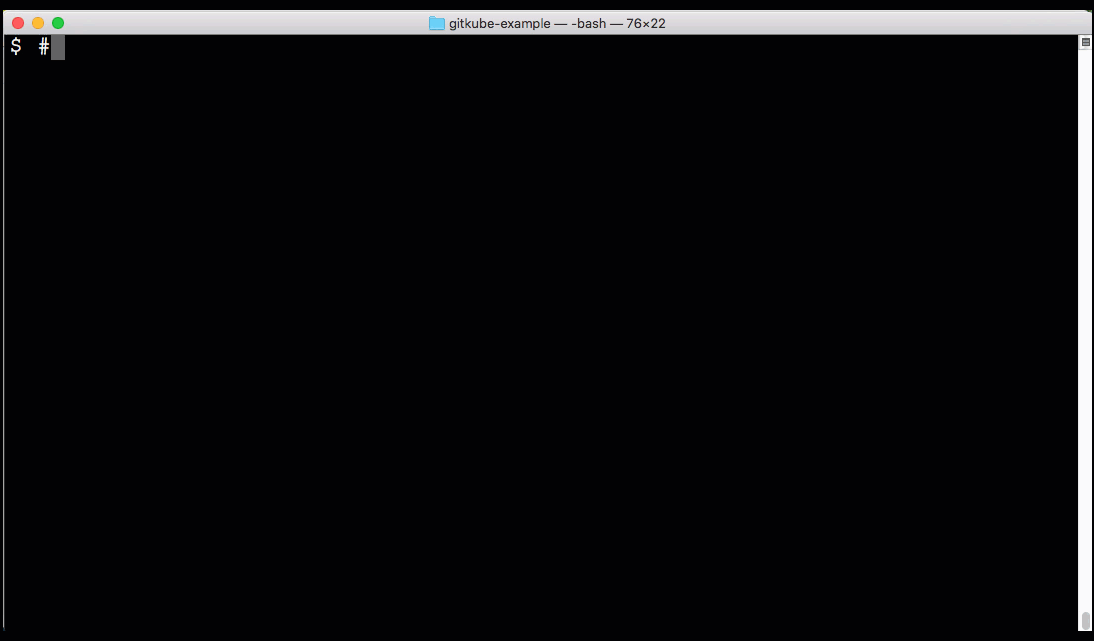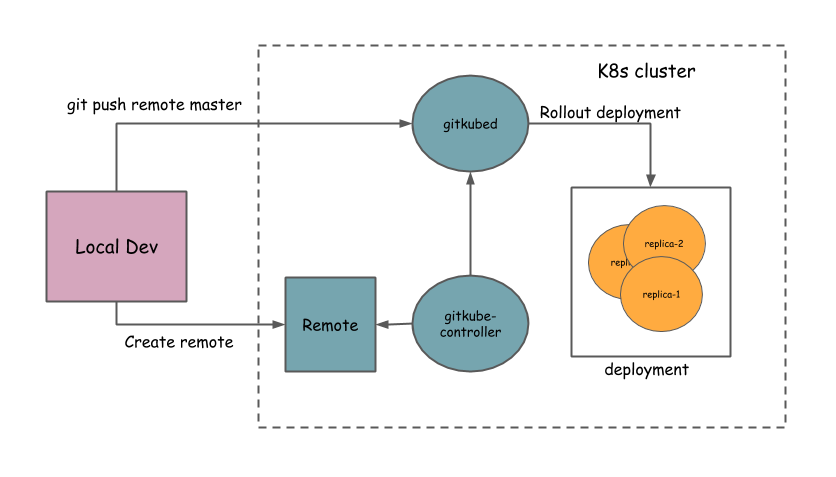
Gitkube
Gitkube is a tool for building and deploying Docker images on Kubernetes using git push.
After a simple initial setup, users can simply keep git push-ing their repos to build and deploy to Kubernetes automatically.


When should I use gitkube?
- Ideal for development where you can push your WIP branch to the cluster to test.
- Reference implementation for writing git-based automation on your server. Fork this repo and create your own CRD + controller + git remote hook that can do things on the Kubernetes cluster.
Features:
- No dependencies except native tooling (git, kubectl)
- Plug and play installation
- Simple public key based authentication
- RBAC ready - Control access to git remotes using RBAC
- Support for namespace based multi-tenancy - Remotes can only deploy to their own namespace
- No assumptions about repository structure
Getting started
Gitkube will run on any Kubernetes vendor/distribution AS IS. In case you find any difficulties in the setup, please comment on #33
Install gitkube
Using kubectl
kubectl create -f https://storage.googleapis.com/gitkube/gitkube-setup-stable.yaml
#expose gitkubed service
kubectl --namespace kube-system expose deployment gitkubed --type=LoadBalancer --name=gitkubed
Using gitkube CLI
-
Install Gitkube CLI:
curl https://raw.githubusercontent.com/hasura/gitkube/master/gimme.sh | bash
- Windows: download the latest release and add it to your
PATH.
-
Use Gitkube CLI to install Gitkube on the cluster:
gitkube install
Provider walkthroughs
The above installation steps work on most Kubernetes clusters. Detailed walkthroughs for few specific providers are also available:
Example
Follow this example repo for a typical workflow of gitkube.
How it works
Gitkube has three components:
- Remote: Custom resource defined by a K8s CRD
- gitkube-controller: Controller that manages Remote objects and propogates changes to gitkubed
- gitkubed: Git host that builds docker image from the repo and rolls out deployment
High-level architecture

Workflow
- Local dev: User creates a base git repo for the application with Dockerfile and K8s deployment
- Setting Remote: User defines a spec for Remote containing the rules for
git push
- Deploying application: Once a Remote is setup, application can be deployed to K8s using
git push <remote> master
Local dev
User should have a git repo with source code and a Dockerfile. User should also create a base K8s deployment for the application.
Setting Remote
A Remote resource consists of 3 parts:
- authorizedKeys: List of ssh-keys for authorizing
git push.
- registry: Details of docker registry where images are pushed post-build.
- deployments: Spec for building docker image and updating corresponding K8s deployment.
Here is a typical spec for a Remote:
apiVersion: gitkube.sh/v1alpha1
kind: Remote
metadata:
name: sampleremote
namespace: default
spec:
# Insert ssh-keys for allowing users to git push
authorizedKeys:
- "ssh-rsa your-ssh-public-key"
# Provide registry details: https://github.com/hasura/gitkube/blob/master/docs/registry.md
registry:
url: "docker.io/user"
credentials:
secretRef: regsecret # Name of docker-registry secret
# Define deployment rules
deployments:
- name: www # Name of K8s deployment which is updated on git push
containers:
- name: www # Name of container in the deployment which is built during git push
path: example/www # Docker build context path in the git repo
dockerfile: example/www/Dockerfile # Location of Dockerfile for the source code
Deploying application
Once a Remote is created, it gets a git remote URL which you can find in its status spec
$ kubectl get remote sampleremote -o yaml
...
status:
remoteUrl: ssh://default-sampleremote@35.225.226.96/~/git/default-sampleremote
remoteUrlDesc: ""
Add the generated remoteUrl in git
$ git remote add sampleremote ssh://default-sampleremote@35.225.226.96/~/git/default-sampleremote
And finally, git push
$ git push sampleremote master
Roadmap
Gitkube is open to evolution. Some of the features to be added in future include:
- Allowing all apps (daemonset, statefulset) to be deployed using
git push. Current support is limited to deployments. #19
- Allowing different git hooks to be integrated #20
Contributing
Gitkube is an open source project licensed under Apache License 2.0
Contributions are welcome.
Community and Support
Maintainers
This project has come out of the work at hasura.io.
Current maintainers @Tirumarai, @shahidh_k.
Follow @gitkube to stay updated.
Gitkube logo concept and design by Samudra Gupta.
 Directories
¶
Directories
¶



